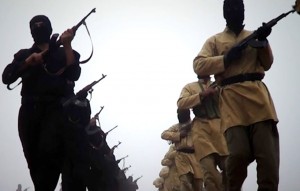Washington Quietly Targets ISIS' Foesby Caleb MaupinNew Eastern Outlook Dec. 22, 2015 |
Popular 
Mike Johnson Pushes Debunked Lie That Israeli Babies Were 'Cooked in Ovens' On October 7

'It Has to Be Stopped': Netanyahu Demands Pro-Palestine Protests at U.S. Colleges Be Shut Down

'These Protesters Belong in Jail': Gov. Abbott Cheers Arrest of Pro-Palestine Protesters at UT Austin

Claim Jewish Student Was 'Stabbed In The Eye' by Pro-Palestine Protester Draws Mockery After Video Released

'We Aren't Going Anywhere': TikTok CEO Vows to Fight TikTok Ban in Court
  In recent months, especially following the Paris attacks, US officials have been publicizing their efforts to fight ISIS. As cable news highlights ISIS atrocities, and a variety of new anti-terrorism measures are put forward, another war is being waged from the highest levels of government. Though it is being kept quiet, US officials are escalating their campaign against the forces who have been fighting ISIS and scoring real victories. In recent months, especially following the Paris attacks, US officials have been publicizing their efforts to fight ISIS. As cable news highlights ISIS atrocities, and a variety of new anti-terrorism measures are put forward, another war is being waged from the highest levels of government. Though it is being kept quiet, US officials are escalating their campaign against the forces who have been fighting ISIS and scoring real victories.Economic War Protects ISIS One armed group that has been key in aiding the Syrian government in its battle against ISIS is Hezbollah. This organization of Shia Muslims in Lebanon has sent thousands of fighters to Syria to stand with the people against ISIS and other foreign-backed anti-government extremists. US leaders have launched a new effort to weaken the Hezbollah organization, which provides social welfare for millions of people in Lebanon. The US Department of Justice and the Drug Enforcement Agency have arrested a number of people around the world, alleging that they are helping Hezbollah to transfer funds. According to the Wall Street Journal, individuals in as diverse places as Lithuania, Colombia, and Canada are facing extradition because they allegedly assisted an organization whose members are each day on the front lines fighting ISIS. Previously in 2011, the United States shut down the Lebanese Canadian Bank, alleging that it was doing business transactions with members of Hezbollah. Despite oil prices being at record lows, the US Congress has announced that it will shortly lift the oil export ban. For the first time since 1973, US oil will be flowing onto the international markets. This move will only add to the already existing glut in the oil markets. The price will drop even lower. The United States and Saudi Arabia's coordination to keep oil prices artificially low specifically hurts three countries: Venezuela, Iran, and Russia. All three of these countries have fought against ISIS on the battlefields of Syria. Russia's intervention, at the request of the Syrian government, has been described as a game changer. Volunteers from the ranks of Venezuela's Bolivarian movement — including a member of the National Assembly — have courageously gone to Syria to fight against terrorism. Iran's Islamic Revolutionary Guard Corps has been consistently standing with the Syrian Arab Army against terrorism as well. In addition to the oil price-fixing, Russia, Iran, and Venezuela are also subject to continued sanctions from the United States as each day they battle a group which is supposedly the primary enemy of the United States. While economic warfare against ISIS enemies continues, it is well documented that the US-aligned regime in Turkey is facilitating the sale of ISIS oil, and allowing weapons to cross its borders. The Zaria Massacre in Nigeria The African wing of ISIS, previously known as "Boko Haram," has killed thousands of innocent people across Nigeria in the last few years. Since the group officially joined ISIS in 2014, its terrorist attacks have increased by 300 percent. Nigeria is the top oil-exporting country on the African continent. Nigeria's vast oil resources are controlled by the Dutch-Wall Street corporation known as Shell. One of the country's loudest voices against ISIS has been the Islamic Movement in Nigeria, led by Sheikh Ibraheem Al-Zakzaky. Zakzaky's ministry is a peaceful, non-military religious movement that focuses on issues of social justice. The Islamic Movement in Nigeria has demanded that its country's oil resources be used to feed, house, and educate the tens of millions of impoverished people in the African continent's most populated country. The organization provides services to the poor, and loudly called for an investigation into the mysterious links and connections between some regional levels of the Nigerian government and ISIS (Boko Haram). In 2014, when Zakzaky's followers held a peaceful march for Palestine on the Day of Al-Quds, 35 of them were shot down by the Nigerian military. On December 12, the Nigerian government opened up an assault — not on the ISIS-affiliated terrorists, but on the Islamic Movement in Nigeria. Reports indicate that over 1,000 unarmed Shia Muslims were killed when the Nigerian army poured into Shia neighborhoods. The incident is being called the Zaria Massacre. Sheikh Zakzaky remains in detention, and the international community remains mostly silent on the issue. As analyst Shabbir Hassanally explained to PressTV: "The Nigerian government, Goodluck Jonathan and this new guy, doesn't do anything without getting a letter, approval, and permission slip from their masters in Washington." Sheikh Zakzaky, who was listed as one of ISIS' biggest enemies on the African continent, is now being detained by the US-aligned Nigerian state. Over 1,000 of his followers are dead. If US leaders are really concerned about protecting the public from ISIS terrorism, why are they quietly waging economic and military warfare against ISIS' top enemies? These realities, along with Ashton Carter's statement that Russia and China are a "bigger threat" than ISIS, should be greatly disturbing to all who seek an end to terrorism and extremism. _ Caleb Maupin is a political analyst and activist based in New York. He studied political science at Baldwin-Wallace College and was inspired and involved in the Occupy Wall Street movement, especially for the online magazine "New Eastern Outlook". |



